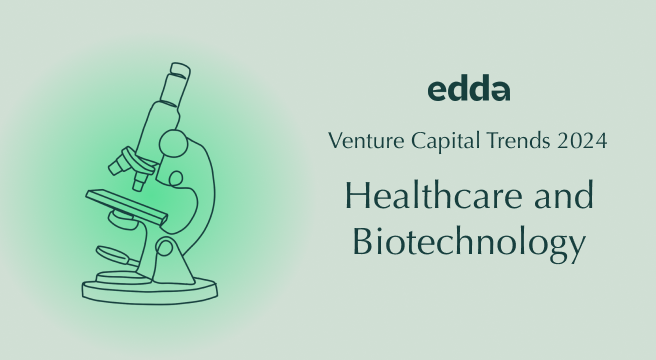Venture Capital Trends 2024: Healthcare and Biotechnology
As we edge closer to 2024, the venture capital scene in the healthcare and biotechnology sectors is booming. This growth is propelled by significant advancements in medical technology and a growing emphasis on personalized medicine, responding to the world’s increasing health challenges and demographic changes.
Global biotechnology market value is estimated to expand by USD 1,345.0 Billion by 2030, with a 15.5% CAGR from 2022 to 2030. This growth is spurred by the sector’s efforts to address crucial issues like effective disease management and reducing environmental emissions.
Despite some fluctuations, venture capital investment in these sectors has demonstrated resilience and adaptability, aligning with the transformative potential of biotechnological innovations.
For venture capitalists, 2024 is brimming with opportunities but also requires nuanced understanding. These sectors offer more than just financial returns, they offer the chance to contribute to groundbreaking medical advancements and sustainable health solutions.
This article explores 2024 trends and strategies in the healthcare and biotechnology domains, and how Edda’s deal flow and portfolio management software can facilitate strategic decision-making in these dynamic sectors.
Predictive Analysis: 2024 Trends in Healthcare and Biotechnology
Artificial Intelligence in Diagnostics and Treatment
The ability of AI to sift through expansive datasets and identify critical health patterns is not just a technological feat; it’s a game-changer in personalized healthcare.
At the forefront of this transformation are IBM Watson Health and Google Health, who are using AI to reshape the very fabric of healthcare delivery. Their tools and technologies are revolutionizing how doctors diagnose diseases and devise treatment plans, making healthcare more accurate and patient-centric than ever before.
For investors, this represents a golden opportunity. The use of AI in healthcare is a convergence of technological sophistication and medical necessity, making it an area ripe for investment. As these technologies continue to develop and integrate into mainstream healthcare, the potential for significant returns on investment grows, making it an alluring prospect for those looking to invest in the future of healthcare.
Precision Medicine and Gene Editing
Precision medicine and gene editing are taking center stage in the healthcare industry, marking a significant leap towards a future where medical treatments are highly personalized. The rise of the groundbreaking gene-editing tool CRISPR, enables precise alterations in DNA, offering the possibility of correcting genetic defects and tailoring treatments to the unique genetic composition of each individual.
The implications of these advancements are profound, promising more effective and targeted therapies. The ability to modify genes in a controlled manner opens up new avenues for treating a variety of genetic disorders, some of which have been challenging to address until now. As such, investment in this domain is seeing a notable uptick, with stakeholders recognizing the immense potential that precision medicine and gene editing hold.
Biomanufacturing and Synthetic Biology
Biomanufacturing and synthetic biology are sectors within biotechnology that are set for notable growth in 2024. Biomanufacturing applies living cells in producing therapeutic goods, a method transforming the production of medicines. Synthetic biology, focusing on the design and construction of new biological entities, offers innovative solutions across various industries.
These domains are vital for the acceleration of drug development and the creation of sustainable manufacturing processes. The unique approach of biomanufacturing in using biological systems for production promises efficiency and environmental sustainability. Synthetic biology, with its ability to tailor organisms for specific uses, holds significant promise in areas ranging from healthcare to environmental management.
In 2024, these fields are expected to attract substantial investment. Leading companies like Ginkgo Bioworks in synthetic biology are pioneering in organism design, while others like Amyris and Twist Bioscience in biomanufacturing are exploring the potential of biological systems for commercial uses.
Telemedicine and Digital Health
Telemedicine and digital health solutions are projected to expand further, driven by the ongoing need for remote healthcare services and the integration of digital technologies in healthcare delivery. These solutions offer convenience, improved access to care, and the potential for cost reduction, making them an attractive area for investment.
Leading this trend are companies like Teladoc Health and Amwell, who are trailblazers in providing virtual medical consultations. Fitbit and Apple, with their health-focused wearable technology, offer insights into personal health metrics. When it comes to patient data management, Epic Systems and Cerner Corporation are progressing with their advanced electronic health record systems, enhancing patient care coordination and data accessibility.
Biotechnology in Environmental Health
Biotechnology’s role in addressing environmental health issues is expected to be a key focus in 2024. This includes the development of bio-based materials and processes to reduce environmental impact, as well as biotechnological solutions for pollution control and waste management.
Indigo Ag, a standout in environmental health biotechnology, is carving a unique path with its innovative microbial treatments aimed at enhancing crop resilience. This cutting-edge approach not only addresses critical sustainability issues in agriculture but also offers a promising investment opportunity.
The sector’s potential to revolutionize materials, waste management, and agricultural practices positions it at the intersection of technological innovation and environmental stewardship, making it an attractive area for investors seeking to contribute to global sustainability goals while capitalizing on emerging market trends.
Regenerative Medicine and Tissue Engineering
Regenerative medicine and tissue engineering are set to make significant strides, with potential applications in repairing or replacing damaged tissues and organs. This trend could revolutionize treatment approaches for various injuries and diseases, leading to improved patient outcomes and quality of life.
Leading the charge in regenerative medicine and tissue engineering are companies like Gilead Sciences and AstraZeneca, renowned for their groundbreaking work in cell therapy and regenerative treatments. Their focus on developing therapies for complex health issues positions them as attractive investment targets. This sector’s potential to transform patient care, especially for the aging global population, makes it a promising area for financial returns and societal impact, marking it as an alluring prospect for investors.
The Role of Government Initiatives & Market Dynamics
Government policies and funding are instrumental in shaping the industry and significant government funding in biomedical research can signal robust opportunities for future commercialization, making certain biotech ventures particularly appealing for investment. Likewise, policy shifts in healthcare reimbursement and drug pricing can substantially impact the profitability and viability of investments in these sectors.
Market trends in healthcare and biotechnology are influenced by a variety of factors including technological advancements, demographic shifts, disease prevalence, and consumer health behaviors. Understanding these trends is crucial for investors.
For instance, a surge in chronic diseases or aging populations can drive demand for specific medical treatments and technologies, presenting lucrative investment opportunities. Similarly, technological breakthroughs in areas like gene editing, personalized medicine, or digital health can open up new investment frontiers.
Strategies for Capitalizing on Emerging Opportunities in Biotech
Investing in healthcare and biotechnology offers a blend of high-risk and high-reward scenarios. A strategic, well-informed approach, coupled with an understanding of the industry’s unique dynamics, can enable investors to successfully capitalize on the transformative potential of these sectors. Key considerations include:
Diversifying Portfolio: The healthcare and biotech sectors carry substantial risks, from delayed market entry to compliance complexities. To mitigate these risks, investors should adopt a comprehensive strategy. This involves conducting extensive due diligence to understand the potential and limitations of each investment thoroughly. Diversifying your investment portfolio across different biotech and healthcare sub-sectors can also help spread and minimize risks.
Strategic Alliances for Informed Decisions: Building alliances with established players in the industry — such as pharmaceutical giants, research institutions, and healthcare providers — can be invaluable. These relationships offer insights into cutting-edge technologies, evolving market trends, and unmet medical needs. Collaborations can also open doors to co-investment opportunities, granting access to a broader range of innovative products and services.
Focusing on Scalability and Impact: Investing in biotech startups with scalable solutions and the potential for significant environmental or medical impact is advisable. Startups that demonstrate a clear path to scaling up and have a tangible impact on society or the environment often present the most sustainable and profitable investment opportunities.
Leveraging Technology and Data Analytics: Utilizing advanced technologies like AI and big data analytics can enable investors to identify emerging trends and promising startups in the biotech sector more effectively. These tools can offer valuable insights into market dynamics and help in making informed investment decisions.
Active Portfolio Management: Beyond financial support, venture capitalists can play a crucial role in guiding biotech startups through strategic planning, mentorship, and regulatory navigation. Active involvement can help steer these companies towards success, especially in a field as complex and regulated as biotechnology.
Long-term Investment Outlook: Given the nature of biotech ventures, which often involve extended research and development phases, adopting a long-term investment perspective is essential. Patience and a strategic long-term view can yield substantial rewards as biotech solutions gradually move from research labs to the market.
Effective Portfolio Management with Edda’s VC Software
As 2024 unfolds, the healthcare and biotechnology sectors present complex yet rewarding opportunities for venture capitalists. Edda’s venture capital software is crucial in this context, offering a suite of features that streamline deal flow and financial portfolio oversight.
The integration of deal flow CRM systems and advanced portfolio analytics within Edda’s platform allows venture capitalists to make well-informed, data-driven decisions. This capability is further enhanced by the platform’s ability to synchronize with data-rich sources like PitchBook, delivering deep market insights and trends analysis.
Edda’s venture capital CRM enables investors to effectively chart their course through healthcare and biotech investments. By offering clarity and agility in investment strategy formulation, these tools empower venture capitalists to identify and capitalize on emerging opportunities, while adeptly managing risk in these rapidly advancing sectors.









